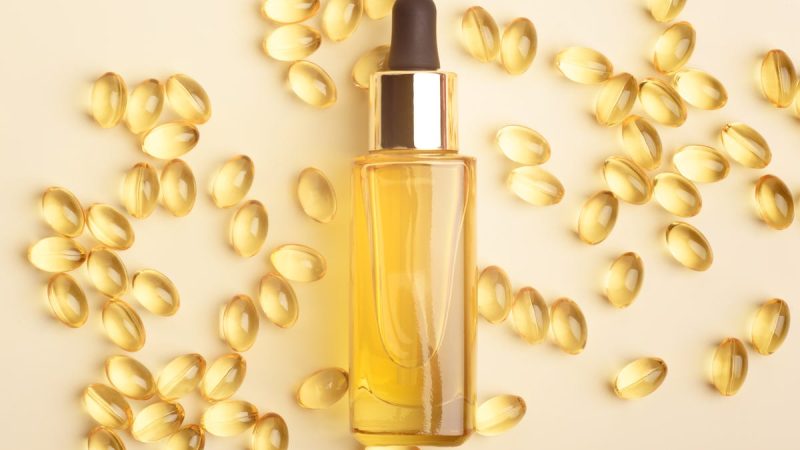Vitamin E is a powerful antioxidant and a vital nutrient for maintaining healthy skin. It plays a crucial role in protecting skin cells from oxidative stress, preventing premature aging, and promoting a glowing complexion. Whether applied topically or consumed through diet, Vitamin E can provide a range of skin benefits. In this article, we’ll explore how Vitamin E works, its benefits, how to use it properly, and tips for achieving radiant skin.
What is Vitamin E?
Vitamin E is a fat-soluble nutrient that comes in eight different forms, but alpha-tocopherol is the most biologically active and commonly used in skincare. It acts as a potent antioxidant, helping to neutralize free radicals that damage skin cells. Naturally found in vegetable oils, nuts, seeds, leafy greens, and some fortified foods, Vitamin E can also be taken as a supplement or applied topically in the form of oils, serums, or creams.
Its dual role—both as a dietary nutrient and a skincare ingredient—makes it a unique and versatile addition to your wellness and beauty regimen.
Key Skin Benefits of Vitamin E
Vitamin E offers a wide range of skin benefits:
a. Moisturizes and Nourishes
Vitamin E is an emollient, which means it traps moisture in the skin and prevents dryness. It strengthens the skin’s natural barrier, making it ideal for people with dry or flaky skin.
b. Fights Free Radicals
Exposure to UV rays, pollution, and toxins generates free radicals that break down skin cells. Vitamin E’s antioxidant power combats these harmful molecules, slowing down signs of aging.
c. Reduces Signs of Aging
Regular use of Vitamin E can help diminish fine lines, wrinkles, and dark spots by supporting cell regeneration and maintaining skin elasticity.
d. Soothes Inflammation and Redness
Vitamin E has anti-inflammatory properties that can calm irritated skin and reduce redness, making it beneficial for conditions like eczema and psoriasis.
e. Supports Wound Healing
Studies suggest Vitamin E aids in the healing of minor cuts, burns, and scars. It accelerates the skin’s repair process and reduces scarring.
Topical Uses of Vitamin E for Skin
Vitamin E is a common ingredient in many over-the-counter skincare products, including:
- Face oils
- Moisturizers
- Anti-aging serums
- Sunscreen
- Eye creams
You can also use pure Vitamin E oil, which is thicker and more concentrated. A few popular uses include:
- Night Treatment: Apply before bed to hydrate and rejuvenate overnight.
- Under-Eye Serum: Helps reduce the appearance of dark circles and fine lines.
- Lip Balm Alternative: Dab a drop of oil to keep lips soft and supple.
Be cautious with pure Vitamin E oil—it’s very thick and may clog pores if you have acne-prone skin. Always patch test before full application.
How to Use Vitamin E in Your Skincare Routine
To reap the full benefits of Vitamin E, follow these best practices:
a. Patch Test First
Apply a small amount on your inner arm and wait 24 hours to ensure there is no allergic reaction.
b. Use at Night
Because Vitamin E is oil-based, it may feel greasy. Nighttime application allows better absorption and prevents makeup interference.
c. Combine with Vitamin C
Vitamin E and Vitamin C are a powerhouse combo. They work synergistically to protect the skin from sun damage and brighten the complexion.
d. Apply After Cleansing
Ensure your face is clean and slightly damp for better absorption. Lock in the Vitamin E oil with a moisturizer on top.
Vitamin E-Rich Foods for Healthy Skin
Topical application isn’t the only way to get Vitamin E—diet plays a vital role too. Consuming Vitamin E-rich foods can enhance your skin health from the inside out.
Include these foods in your diet:
- Almonds
- Sunflower seeds
- Avocados
- Spinach
- Hazelnuts
- Olive oil
These foods not only boost your Vitamin E levels but also supply other skin-loving nutrients like healthy fats, zinc, and antioxidants.
Who Should Avoid Vitamin E?
While Vitamin E is generally safe, certain individuals should be cautious:
a. Oily or Acne-Prone Skin
Pure Vitamin E oil can clog pores and exacerbate acne. Opt for products that list Vitamin E lower on the ingredient list or use non-comedogenic formulas.
b. Allergies or Sensitivities
Some people may experience irritation, rash, or itching. Always conduct a patch test first.
c. Overuse Risks
Too much Vitamin E—especially through supplements—can lead to toxicity. Always follow dosage recommendations.
Tips for Glowing Skin with Vitamin E
To get that radiant glow with Vitamin E, follow these practical tips:
- Hydrate your skin daily with a moisturizer that contains Vitamin E.
- Use sunscreen—Vitamin E enhances UV protection but doesn’t replace SPF.
- Incorporate a Vitamin E serum 2–3 times a week.
- Eat a balanced diet with Vitamin E-rich foods.
- Avoid smoking and pollution to prevent oxidative stress.
These lifestyle and skincare habits, when combined with Vitamin E use, will significantly boost your skin’s appearance and health.
Conclusion
So, is Vitamin E good for your skin? Absolutely. With its deep moisturizing properties, antioxidant protection, and ability to support healing, Vitamin E is a versatile and effective ingredient for maintaining healthy, youthful skin. Whether you choose to apply it topically or consume it through your diet, integrating Vitamin E into your skincare regimen can result in a brighter, smoother, and more radiant complexion. As with any skincare product, always listen to your skin and consult with a dermatologist if you have specific concerns.
FAQs
1. Can I use Vitamin E on my face every day?
Yes, but it depends on your skin type. For dry or mature skin, daily use may be beneficial. Oily skin types should use it 2–3 times a week.
2. Does Vitamin E help with acne scars?
Vitamin E may help lighten scars over time due to its healing properties, but it’s not a guaranteed solution and may irritate acne-prone skin.
3. What’s the best time to apply Vitamin E oil?
At night, so it can absorb into the skin without interference from sun exposure or makeup.
4. Can I mix Vitamin E with other oils or serums?
Yes, it pairs well with carrier oils like jojoba or argan oil and vitamins like Vitamin C. Always patch test combinations.
5. Is Vitamin E safe during pregnancy?
Topical use is generally safe, but always check with your healthcare provider before using any new product during pregnancy.
Also read: Is Vitamin E Good for Your Skin? Benefits, Uses & Tips for Healthy Glow





